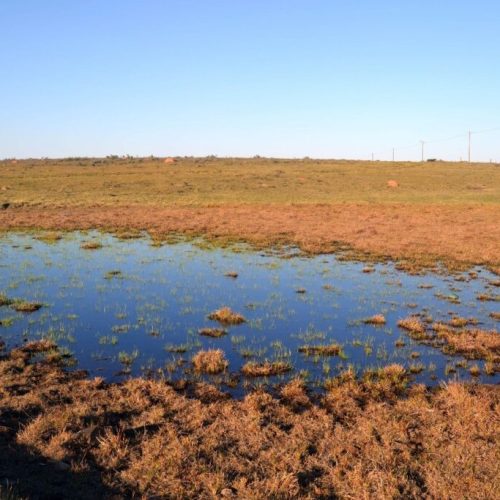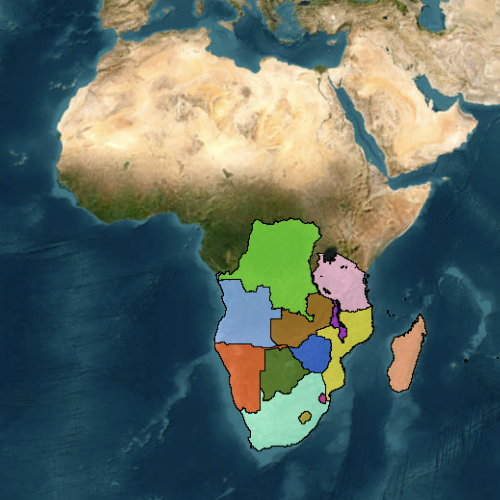SOUTHERN AFRICA
In many parts of Southern Africa, communities are facing recurrent and longer droughts. Drought resilience is strongly linked to access to groundwater and proper development and management of this resource. CIWA’s current engagement in the region focuses on the development of transboundary groundwater utilization and management capacity and is contributing to the development of a new drought-risk management framework.
Sustainable Groundwater Management in SADC Member States
- Year started: 2014
- Status: Active
- Key Partner/s: Southern African Development Community Groundwater Management Institute (SADC-GMI), OrangeSenqu Commission (ORASECOM), Limpopo River Commission (LIMCOM), Cuvelia River Commission (CUVECOM), Zambezi Watercourse Commission (ZAMCOM), and Okavango River Commission (OKACOM)
The 16 member states of the Southern African Development Community (SADC) region are highly affected by climate change, especially repeated and protracted droughts, affecting food security, energy production, and access to water and ecological services. The lack of climate-resilient infrastructure and climate-proof insurance in most Southern African countries will likely exacerbate these risks.
The critical importance of groundwater in supporting development and resilience has made it essential to improve sustainable use of both surface and groundwater in the region, which has 30 transboundary aquifers and 15 river basins.
The Sustainable Groundwater Management in SADC member states project, which closed in 2021, helped mitigate the effects of climate change, pollution, and rapidly growing water demand by strengthening institutional and technical capacity to implement national reforms and facilitate cooperation on shared aquifers. The 13 completed subgrants projects were at the core of affecting change in groundwater management that improved socio-economic conditions, access to water, and equitable distribution of groundwater resources. To strengthen regional water management policies, the project also developed analyses and action plans for all 16 SADC states and at the regional level.
Southern Africa region groundwater project helps manage water and food security impacts, boost livelihoods
CIWA announced in June 2022 the approval of the Southern African Development Community Groundwater Institute’s (SADC-GMI’s) Phase Two project. The SADC-GMI, an established Southern African Development Community Groundwater Management Institute’s regional Center of Excellence in sustainable groundwater management, leads the critical function of promoting and implementing groundwater management projects at the national and transboundary levels. The project team completed the Phase One project in June. Notable achievements include reactivating the SADC Groundwater Information Portal (expanding its connection with 20 regional databases) and the enhancement of West Africa page the GMI grey literature archives. Phase One also featured regional activities to promote transboundary aquifer management, 13 sub-grant pilot projects in SADC member states, and an internship program for 65 young professionals (22 were women).
Building on the dynamic Phase One project, this $9 million CIWA-funded project provides the SADC-GMI strategic guidance on how to manage water and food security impacts, boost livelihoods, and adapt to climate change. This is also in line with the SADC’s regional policies and strategies, which position groundwater as playing a key role in building resilient livelihoods. This also takes into consideration the increasing attention to the conjunctive use and management of both surface and groundwater resources. A complementary $5 million Global Environment Fund (GEF) grant is under preparation to further support this project.
Back to topSouthern Africa Drought Resilience Initiative
- Year started: 2020
- Status: Closed in 2023
- Key Partner/s: SADC institutions, River Basin Organization and SADC Member States.
Population growth affects river systems in terms of water use and pollution, and droughts are adding to pressures on water resources in Southern Africa. Riparian economies depend on hydropower from the Zambezi River, but high climatic variability puts significant pressure on hydropower generation, and climate change will cause an increase in evapotranspiration from higher air temperature.
This technical cooperation, which is in its second year, integrates across sectors to lay the foundation for making Southern African countries more resilient to the multiple impacts of drought. Its main objectives are to generate tools and dialogue for enhancing partnerships and capacity across the region and to inform future national and regional investments in drought resilience-building activities.
SADRI addresses cross-border drought risks, promotes cooperative management of shared natural resources, and creates an integrated vision of drought-risk management across the water-energy-food-environment (WEFE) nexus. It supports technical assistance and analytics along three pillars – cities, energy systems, and livelihoods and food security – and fills knowledge gaps, advises on transboundary drought-risk management strategies and approaches, and connects to potential investments.
SADRI produced Drought Resilience Profiles that provide a snapshot of the drought situation in each country, as evaluated through SADRI’s organizing approach, which is predicated upon the integrated drought risk management framework: 1) monitoring and early warning systems; 2) vulnerability and impact assessment; and 3) mitigation, preparedness, and response. The Profiles are meant to establish a baseline and to serve as a conversation starter for where and how to move from reactive to proactive drought management.
SADRI Drought Profiles: Angola, Botswana, Comoros, DRC, Eswatini, Lesotho, Madagascar, Malawi, Mauritius, Mozambique, Namibia, Seychelles, South Africa, Tanzania, Zambia and Zimbabwe.
Back to topDISCOVER OUR PUBLICATIONS
Watch, read and listen more on CIWA’s engagements in Southern Africa.

Nathan Engle shares his experience working in climate change, specifically, in one of climate change’s most subtle, not so well understood, and deadly manifestations: droughts. Blog: Bringing integrated drought risk management to the forefront in Southern Africa.

Reginalda Joseph, Hydrogeologist, Ministry of Agriculture, Water and Land Reform, Namibia shares her journey as a woman in the water sector and explains how women can break the barriers. Listen to CIWA’s first exciting podcast.

The Geo Map with all SADRI Drought Profiles available: Angola, Botswana Comoros, DRC, Eswatini, Lesotho, Madagascar,
Malawi, Mauritius, Mozambique, Namibia, Seychelles, SouthAfrica, Tanzania, Zambia & Zimbabwe. Click to see the map.



